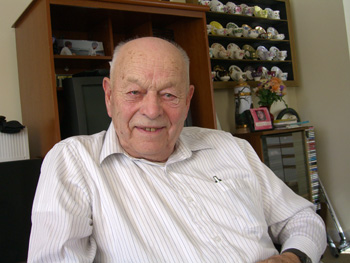
Herb Hunt got his start as a farmer and as a soldier in the CCC.
Photo by Catherine Winter

Herb Hunt: Memories of the CCC
When Herb Hunt was a teenager, he wanted to join the military. World War II was brewing, and other guys he knew had already enlisted.
"My cousin was writing to me from the Philippines," says Hunt. "He was in the Navy, and he says, 'Herb, you better hurry up and enlist because the war's going to break out over here and it'll start without you.'"
Hunt tried to enlist, but the Army wouldn't take him because he was only 17. The Navy wouldn't take him because he had bad teeth.
A buddy suggested he enlist in the Civilian Conservation Corps instead, but initially the CCC wouldn't take him, either. The CCC was meant to provide jobs for young men from poor families, and Hunt's family wasn't poor enough.
"There were eight of us and my dad was getting $20 a week" working for an undertaker, Hunt says. But that was enough to live on at the time.
"I felt we were middle income, you know, because there were so many cases where you'd see an elderly man walking down the street in a big heavy overcoat, and he'd be taking a bottle out of his pocket, drinking, probably never had a home," Hunt says. "We lived near a large pond where they used to cut ice in the winter. The icehouses were just about going out then because the new way of making ice was with electricity. And they'd go over in those old icehouses, and there was big piles of sawdust, and they'd make themselves little places to sleep. And I knew those were the poor people."
Eventually an uncle who knew a local CCC administrator interceded on Hunt's behalf, and Hunt got in. He was sent to a camp in Bellows Falls, Vt.
Hunt knew how to type, so he was assigned to work in the office, typing out the payroll and the duty roster.
"I got tired of the job I had and asked to go out and work in the field, and there was days I regretted that because it didn't matter if it was ten below zero or what, we had to go out," Hunt says. But he says the CCC provided the recruits with warm woolen clothing and long underwear. And he discovered that most of the time, he loved working in the woods.
He says the men were assigned to duty they called "bug-o." They painted gypsy moth eggs with creosote.
"We'd come home to the dining room, to a nice hot meal," he says. "They fed us well."
At night, they slept in shared, open barracks, on rows of cots. "We had those tarpaper shacks and inside there would be two or three coal burning stoves," Hunt says. "Some of the men, instead of KP [kitchen duty], they'd have to keep the fires stoked up."
Weekends, they could walk into Bellows Falls and see a movie or go to church.
"I remember the people were very nice, the civilian people," Hunt says. "There was one lady there that used to have her kitchen open for the boys, any boys who were walking to town, we had to go by it, and we could go in. Maybe we paid for it. But she'd bake pies and, oh, all kinds of goodies and have hot chocolate or coffee or whatever."
Hunt says his CCC experience was good training when he finally got into the Army, shortly after he turned 18.
He enlisted in 1940, and was sent to Hawaii. He was there the day the Japanese bombed Pearl Harbor, at a barracks a mile from the harbor. Later, he served in the Solomon Islands and the Philippines.
When Hunt got out in 1945, the thing he wanted most was to go back to Vermont and buy a farm. He credits his time in the CCC for kindling that desire. "From being in the city and getting out, I got a love for forestry," he says. Eventually he ran a Christmas tree farm, as well as a dairy farm, in Vermont.
Hunt joined the National Guard and was called to active duty in the Korean War. He later served in Vietnam, too. He eventually reached the rank of full colonel. He's proud to say he's one of few colonels with no high school degree.
These days, Hunt lives in an assisted living apartment with his wife in Williamstown, Vt., a few miles from where he farmed. He's made some scrapbooks of those days in the 1930s and '40s, cutting out pictures from magazines. He goes to reunions of CCC alumni when he can get to them. He has photos of last summer's reunion, at a state park. Only a half dozen or so CCC boys were able to make it, but Hunt says it was a good time. He points to one photo: "That's the governor, shaking my hand."
Hunt used to have pictures of his days in the CCC, too, but he's given most of them to a museum in Barre, Vt., so people who can't remember that far back can see what the CCC was like.
Back to CCC, or return to Bridge to Somewhere.
